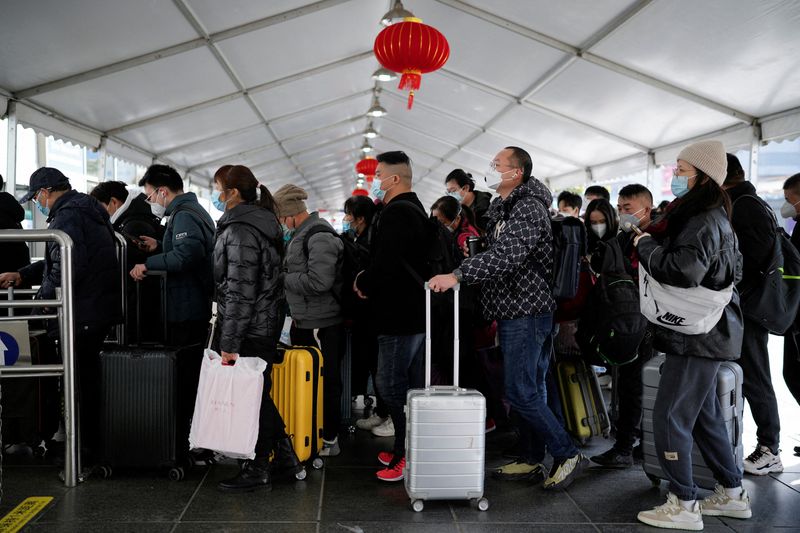SHANGHAI (Reuters) -Urban workers crowded train stations across China's largest cities on Tuesday as travel for Lunar New Year holidays hit high gear, an early sign of economic recovery as officials confirmed a plunge due to COVID-19 curbs.
The world's second-largest economy slowed sharply in the fourth quarter, data showed on Tuesday, dragging 2022 growth down to one its worst performances in nearly half a century after three years of COVID restrictions and lockdowns.
With mass travel for the Lunar New Year possible for the first time in nearly three years after the relaxing of some of the world's tightest COVID curbs, the economy stands to gain from hundreds of thousands of people a day spending more as they return to China's hinterland.
While many analysts say a return to economic normality will be gradual as the impact of COVID weakens, some see the Lunar New Year as a welcome early consumption boost.
"Peak infections passed in major cities in January, and with the Spring Festival coming, tourism is back, and the signs of a recovery in consumption are obvious," said Nie Wen, a Shanghai-based economist at the investment firm Hwabao Trust.
But with so many people on the move, health experts fear a deepening of the COVID outbreak, leaving the elderly in rural villages particularly vulnerable.
Despite authorities confirming a huge increase in deaths on Saturday - announcing that nearly 60,000 people with COVID had died in hospitals between Dec. 8 and Jan. 12 - World Health Organization (WHO) officials are seeking more accounting of death rates.
The WHO earlier welcomed Saturday's announcement after last week warning that China was heavily under-reporting deaths from the virus.
Reuters reported on Tuesday that doctors in both public and private hospitals were being actively discouraged from attributing deaths to COVID.
Specifically, the U.N. agency wants information on so-called excess mortality - the number of all deaths beyond the norm during a crisis, the WHO said in a statement.
"This is especially important during periods of surges when the health system is severely constrained," it said.
The WHO added that it would continue working with China to provide advice and support, but had not yet fixed another formal meeting with Chinese officials after WHO Director General Tedros Adhanom Ghebreyesus spoke with Ma Xiaowei, director of China's National Health Commission, at the weekend.
RISK, BUT OPTIMISM
The Ministry of Transport has estimated the rush will see a total of 2.1 billion passenger trips nationwide between Jan. 7 and Feb. 15 as many city dwellers make the most of their first chance for Lunar New Year trips to see extended family in home regions since the pandemic began.
Chinese officials jettisoned Beijing's "zero COVID" policy - an approach previously championed by ruling Communist Party leader Xi Jinping - in early December, letting the virus run unchecked across its population of 1.4 billion people.
Those stringent policies have further damaged China's demographic outlook, now at the start of a historic decline with government figures released on Tuesday showing the population fell for the first time in six decades.
State media reported that some 390,000 passengers were expected to travel from Shanghai train stations on Tuesday alone for what is known as the Spring Festival holiday - seen as the world's largest annual mass migration before COVID.
As travellers moved through stations in Shanghai, China's largest city, some expressed optimism despite the risks.
"I am not worried about the virus. Because we are young, our immunity is okay," 37-year-old migrant worker Zhou Ning told Reuters outside the Shanghai Railway Station as he prepared to head back to his home area in Bazhong in the northeastern province of Sichuan.
"Back in my hometown, there are many people who have tested positive, but I am not worried about it."

On a train leaving Shanghai, fellow migrant worker Feng Hongwei, aged 21, said he was "so happy, so excited" as he began a trek home to Puyang, Henan. "I haven't seen my parents in two years".
The holiday season has also sparked a revival in domestic air travel with more than 70,000 flights across China between Jan. 7-13, according to industry data reported by Shanghai Securities News on Monday. That is equivalent to more than 80% of the levels seen before the pandemic.